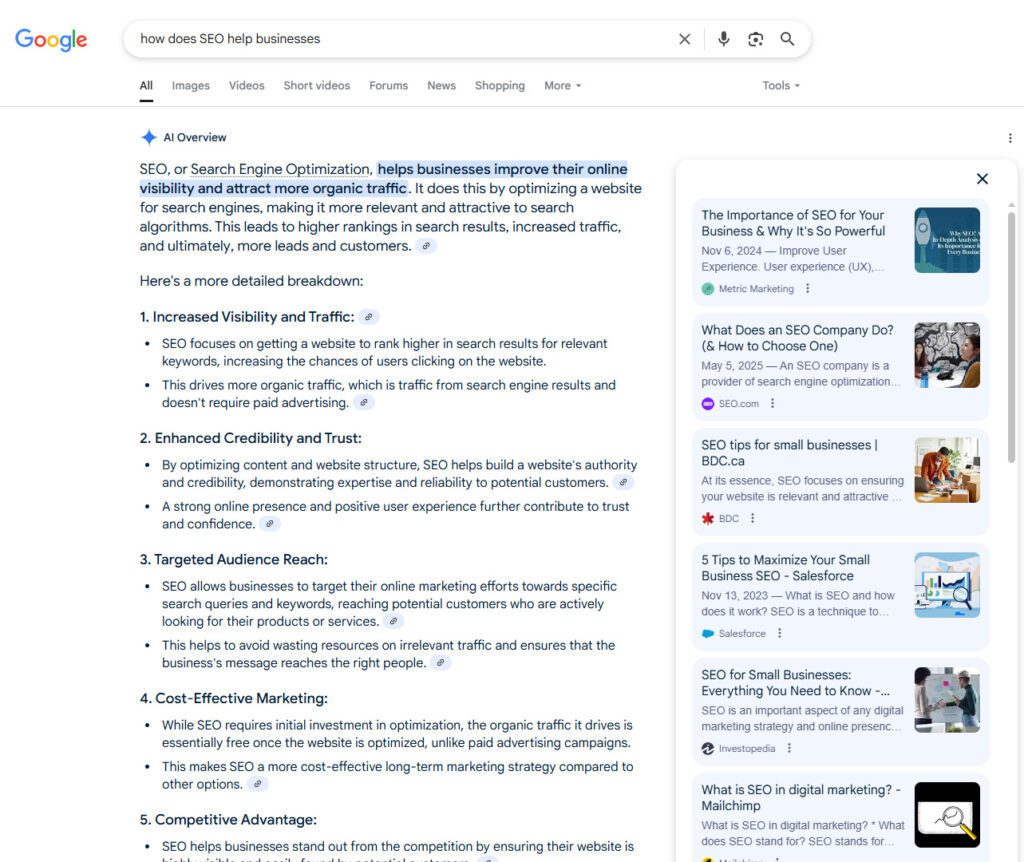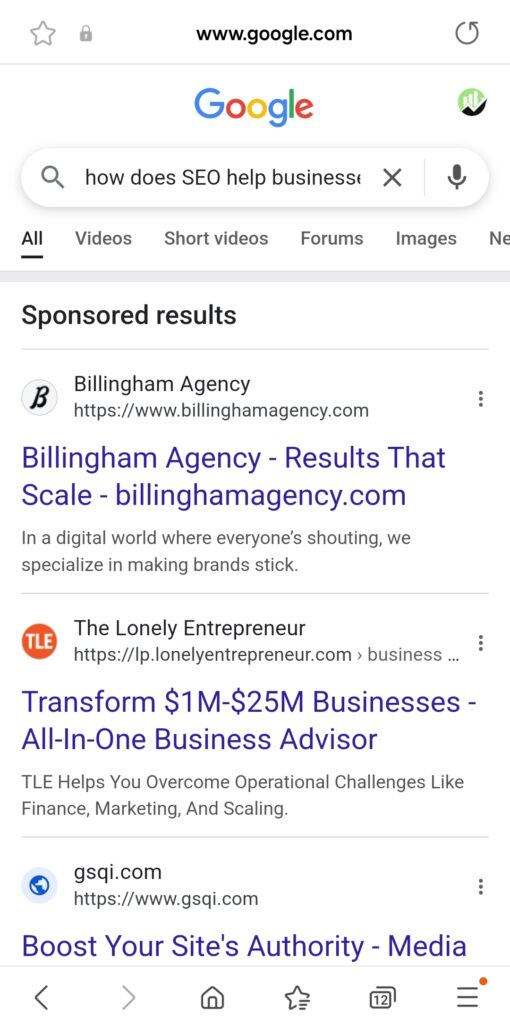Search engines were invented to guide people to information. But something’s shifting, almost silently. Google, the undisputed heavyweight of search, is redrawing the very borders of the category. Thanks to AI Overviews and an ever-growing array of rich SERP features, Google isn’t just pointing at content anymore; it’s becoming the content itself.
Sure, Bing, DuckDuckGo, and others are experimenting with AI overviews too. However, it’s Google’s decisions that redraw the industry’s boundaries, as it’s synonymous with search. Most people say “googling” to refer to searching on the internet. They don’t say “binging.”
AI Overviews generate full answers by blending information from multiple websites, often satisfying the searcher’s question without a single click. The origin of that knowledge becomes an afterthought, even though links to sources are provided.
So we have to ask: When does a search engine stop being a search engine?
The Original Contract: Crawlers, Creators, and Clicks
For decades, the web has run on an unwritten deal between creators and platforms:
- Creators publish helpful content.
- Google indexes it.
- Searchers see a link, click through, and everyone wins.
Traffic is the currency that keeps digital publishing alive, whether it fuels ad revenue, affiliate sales, service inquiries, or simply brand awareness.
Google prospers too, acting as the trusted bridge between questions and answers while monetizing that bridge responsibly with ads.
But today, the bridge is increasingly designed to keep travelers on the bridge.
Zero Click Searches
AI Overviews (formerly Search Generative Experience) sit atop many results pages, synthesizing answers from across the web. They’re often accurate, sometimes speculative, and increasingly self-contained. Users get what they need and move on—no need to visit the source.
But here’s the rub: those neatly packaged insights come from real websites created by real people who invested real effort.
Yet attribution is delivered in a way that’s easy to overlook.
- On Google, source links do appear directly within the AI Overview, represented by a small chain icon beside certain phrases. However, these icons are subtle, lack clear labeling, and are not easily noticeable or clickable for most users.
- An additional list of source articles appears on the right-hand panel (desktop devices), which is more prominent and clickable, but visually separated from the AI-generated answer. It would also be moved downward on mobile devices if it’s not hidden on mobile.
- Many users are unlikely to realize that the small chain icon element represents a direct link to the underlying sources.
In other words, attribution exists, but it’s not great for discoverability and certainly not optimized to drive traffic. Here are the desktop and mobile views of Google search as of this article.


Attribution Is Not Optional
If a search engine uses your content, whether through a direct snippet or a large language model summary, it must provide clear, click-worthy credit. Anything less breaks the social contract that built the open web.
Acceptable attribution looks like this:
- Prominent links to every source.
- A design that actually invites the user to visit those sources.
Content is labor. Someone—often a small publisher, a solo expert, or a nonprofit—invested time, knowledge, and money to produce it. They deserve more than a silent nod.
If Google Gets Away with It, Everyone Will
Society must hold search engines accountable. Social media platforms offer a preview of what happens when attribution and outbound traffic are deprioritized—and it’s not good for publishers or users.
Social platforms tilt their algorithms toward content that keeps users on-platform. For example:
- Instagram restricts link access by ensuring no links in post descriptions are clickable.
- TikTok disables clickable URLs unless creators meet specific follower thresholds.
- X (formerly Twitter) deprioritizes link previews, pushing users to consume in-app threads instead.
If the world’s largest discovery engine stops sending traffic, why should any other platform bother?
Once attribution dies, the entire creator economy—blogs, niche media, indie newsletters—faces a slow suffocation.
And that won’t just hurt creators. It will starve users of diverse, trustworthy, and independent perspectives.
Who Survives an AI-First Internet?
Not every publisher will be steamrolled if the worst occurs. Three groups have a fighting chance.
- Product-Focused Brands: If your content supports an owned product—say, a niche SaaS tool, a course, or a physical gadget—search can still funnel purchase-ready visitors. A summary can’t replicate the checkout button.
- Experience-Based Reviewers: Channels that showcase hands-on testing, proprietary benchmarks, and unique video footage will be ok. AI can’t replicate the first-person experience.
- Audience-Owning Publishers: Creators with robust email lists, private communities, or mobile apps sidestep algorithm turbulence. They’ve swapped rented traffic for owned reach, and that buffer will only grow more valuable.
Everyone else must rethink their moat, fast.
We’re Not Anti-AI—We’re Anti-Extraction
AI that clarifies complex queries, translates jargon, or surfaces overlooked resources is fantastic.
Most creators welcome better user experiences. What they reject is one-sided value extraction: tech giants ingesting their work to answer questions, then hoarding the user’s attention and the ad dollars inside walled gardens.
If you profit from creators, you owe them traffic or payment. Otherwise, the incentive to publish evaporates, and AI’s well of high-quality training data might eventually run dry.
The Necessary Resolution
Governments are noticing the power imbalance and acting.
- Australia forced Google and Facebook to compensate news outlets, proving negotiation is possible.
- The EU’s Digital Markets Act demands transparency in ranking and link placement, prying open the black box just a bit.
- Canada’s Online News Act triggered a brief Google threat to pull results, but public backlash made the search giant reconsider.
The message is clear. Platforms must either:
- Pay for content.
- Send meaningful traffic to it.
When Search Stops Sending Traffic, It Stops Being Search
A real search engine is a gateway, not a destination. It redirects the curious to the best source.
The moment that outbound flow dries up, the product morphs into something else: a walled garden dressed up as an open road.
Yes, Google still crawls, indexes, and sends traffic to sites. But increasingly, its results are final answers—endpoints, not signposts. And this breaks the unwritten agreement that built the modern web.
The fight for clear, clickable attribution isn’t only for legacy newsrooms. It’s for hobby bloggers, educators, consultants, indie SaaS founders—anyone who relies on discoverability. If attribution fades, so does your reach.
What to do now:
- Diversify Your Channels. Build email lists, communities, podcasts—any platform you control.
- Speak Up. Comment on policy drafts, support creator-friendly legislation, and call out bad product design.
- Collaborate. Join alliances or trade groups lobbying for fair-share frameworks.
Silence is compliance, and compliance will shrink the open web.
Final Thoughts
AI does belong in search. Summaries can shorten research paths, translations can break language barriers, and semantic understanding can surface hidden gems. But without clear, clickable attribution or equitable compensation, the creator ecosystem collapses.
Creators deserve recognition. Users deserve transparency. And the internet deserves an engine that still points outward.
Because again, the moment a search engine stops sending you away… it stops being a search engine.
Related:
- AI Adoption in Business Operations: How AI is Transforming Businesses
- AI Agents: The Ultimate Guide to Intelligent Systems
- AI Agents vs. Custom GPTs: What You Need to Know

Gabriel Nwatarali is a copywriter, SEO expert, and the founder of Tech Help Canada. He helps founders attract the right kind of search traffic through SEO strategy, content that ranks, and conversion-focused copy. In one project, a single copy tweak helped a brand increase downloads from a few hundred to 10M+. Want a second set of eyes on your site? Reach Out Here
Want a heads-up once a week whenever a new article drops?







